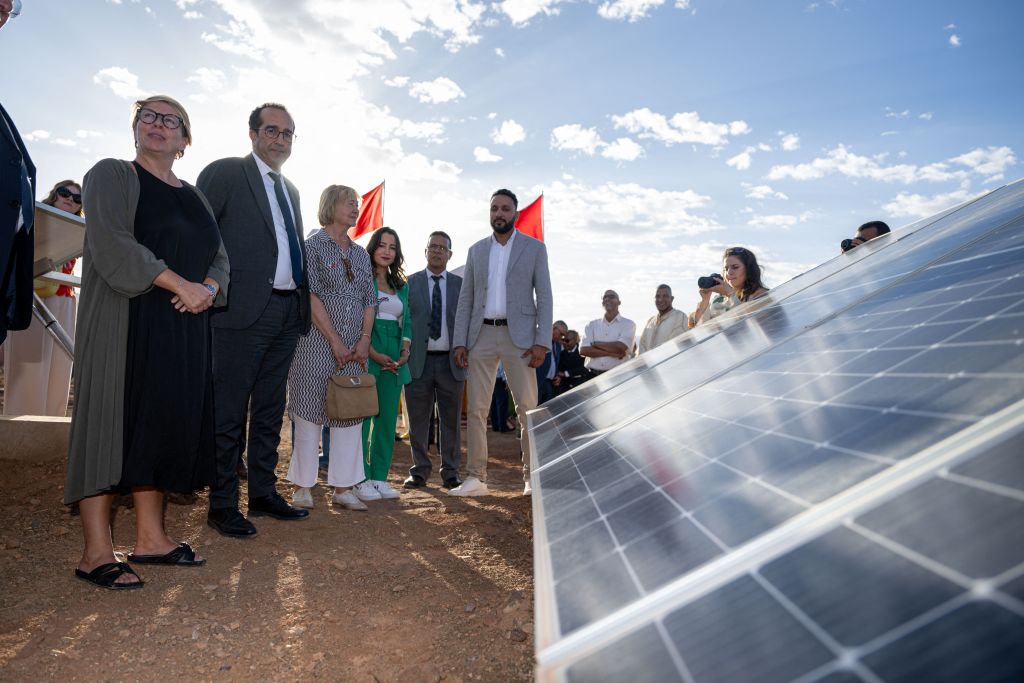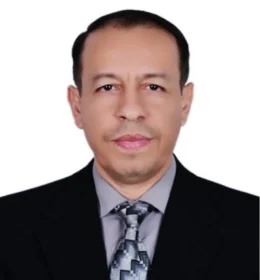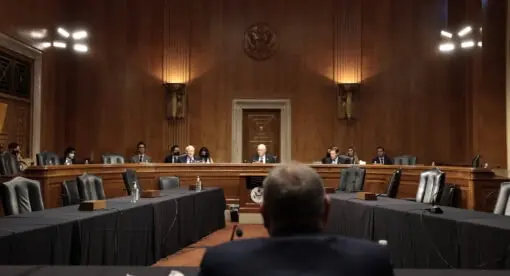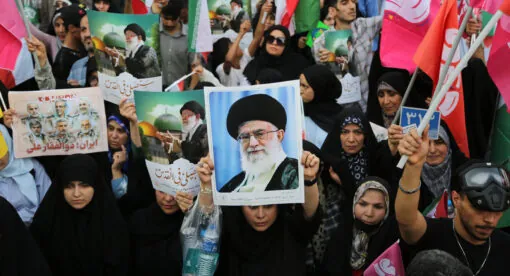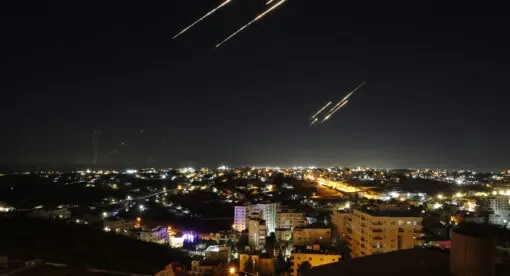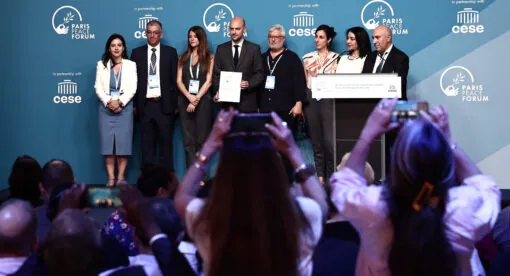The energy fallout of the ongoing Russia-Ukraine war has forced European states to look for alternative sources of both conventional (nonrenewable) and renewable energy. Europe has looked to Africa to meet its demand, but the African states with the largest conventional energy reserves are plagued by instability that limits access.
As Europe moves toward a transition to green energy, it should invest in ways to help African states remove obstacles to the use of their sustainable and renewable resources. U.S. policymakers should aid these efforts with financial support, a move that will strengthen U.S. relations with African countries and help to advance its counterterrorism and great-power competition goals in the region.
Two countries that can help Europe fulfill these objectives are Morocco and Algeria. Both nations have renewable energy reserves in solar and wind power and hydropower that can be utilized to create green hydrogen, a renewable energy source that is already beginning to secure European investments. The infrastructure needed to produce and transport green hydrogen is extensive, and political obstacles include fraught Moroccan-Algerian relations and Algeria’s ties with Russia. However, investment in the sector can help to improve these relations and achieve European and U.S. economic and political goals in North Africa.
Challenges to Conventional Energy Projects in Africa
Although Africa is home to a significant number of nonnuclear renewable energy power systems including bioenergy, hydropower, solar PV (or solar photovoltaic panels), and wind power, this type of energy accounted for less than 10% of Africa’s total power generation as of 2021. Most of Africa’s electricity comes from fossil fuels such as oil, natural gas, and coal. Nigeria, Algeria, and Libya play key roles in the natural gas and crude oil markets as the countries with the largest reserves and highest export levels for these fossil fuels in Africa. Yet instability and increasing Western disinvestment limits these nations from helping Europe diversify its energy sources away from Russia. Additionally, planned construction projects for pipelines to transport gas through multiple West African countries to Europe will run into the same problem of instability, making renewable energy opportunities in other, more stable countries a wiser investment for European nations.
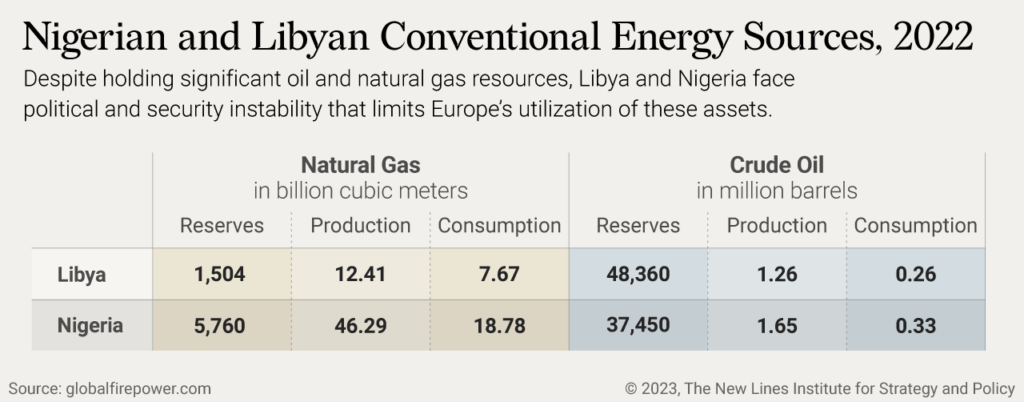
The European Union has already begun to recognize this trend and to shift away from fossil fuels in order to match its goal, outlined in the European Green Deal, of generating net-zero greenhouse gas emissions by 2050. Within the Green Deal, a segment that focuses on the clean energy transition addresses one key element related to Europe’s over-reliance on African conventional energy: “ensuring a secure EU energy supply.” While the EU is devoting funds from both its annual budget and its COVID-19 recovery budget to financing this Green Deal, this green transition’s speed must adjust to events on the ground in West and North Africa’s main fossil fuel-producing states.
Nigeria’s massive fossil fuel resources currently are being used in a very limited capacity. As of mid-2022, the EU annually imports 14% of its liquefied natural gas (LNG) from Nigeria. Even though the EU is interested in importing more, security breaches of the pipelines and their outdated infrastructure have led to limited output and contributed to the decrease in the amount of Nigerian LNG exported to Europe over the past couple of years. Two major projects have been agreed on by pertinent nations to transport Nigerian natural gas to Europe despite these difficulties, but their successful construction and operation will depend on an increase of local gas production and new regional gas infrastructure that currently faces instability in the Sahel and greater West African region.
Multiple West African nations have attempted to create the infrastructure needed to better realize Nigeria’s natural gas supply, but these initiatives are constrained by regional instability; two projects in particular demonstrate this. First, Algeria, Nigeria, and Niger signed a memorandum of understanding for a trans-Saharan gas pipeline project in July 2022 that could, if successful, provide Europe potential alternatives to Russian energy. The Trans-Saharan Gas Pipeline (TSGP) would transport gas from Nigeria to Niger to Algeria, before being transported to Italy via the undersea Transmed pipeline or being converted to LNG tankers and shipped elsewhere. The Nigerian and Algerian governments signed a Memorandum of Understanding for the project mid-2022, and the pipeline is supposed to start operating fully in 2030.
The second project is the Nigeria-Morocco gas pipeline (NMGP) that intends to transport Nigerian gas through Benin, Togo, Ghana, Ivory Coast, Liberia, Sierra Leone, Guinea, Guinea-Bissau, Gambia, Senegal, and Mauritania. The gas would then go from Morocco to Spain through the existing Maghreb-Europe gas pipeline. There are multiple issues standing in the way of the project’s success, including the cost and the lack of a timeline. Because of the large amount of physical terrain that needs to be traversed during the project’s implementation, certain aspects, such as handoffs between separate phases of the project, will be challenging to accomplish.
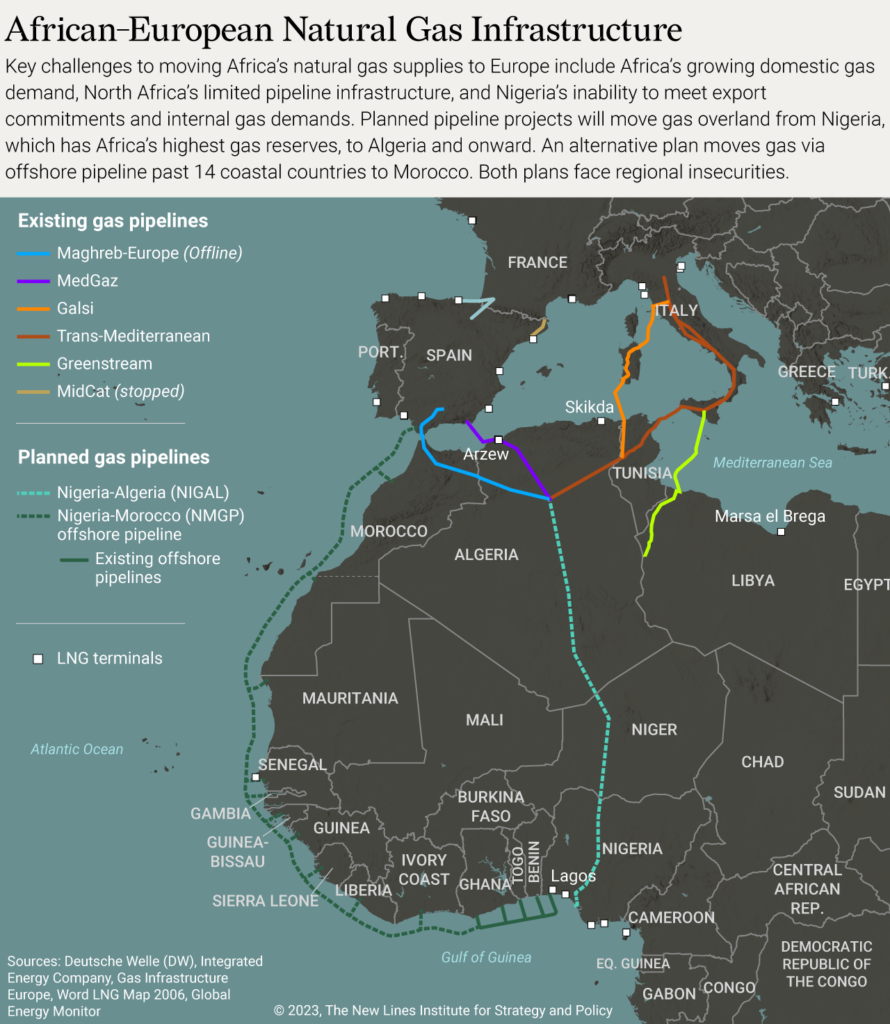
Morocco and Algeria continue their efforts to advance their respective projects, but both the TSGP and the NMGP are in jeopardy of being derailed because of Niger’s July 2023 coup. Junta leaders who toppled Niger’s democratically elected government said it failed to respond to growing insurgent threats, similar to the rationale used in the 2021 coup in Mali and the 2022 coup in Burkina Faso. With the threat posed by local jihadist affiliates of al Qaeda and the Islamic State of Iraq and Syria only having increased in Mali and Burkina Faso since those respective coups, Niger’s outlook for the creation, staffing, and use of multiple natural gas pipelines amid this instability seems unlikely. The situation highlights the importance of looking outside of the main energy-producing West African states to meet Europe’s demand.
Libya is another country whose energy potential has been severely hampered by its continued armed conflict between its U.N.-recognized government and that of the Libyan general Khalifa Haftar and his Libyan National Army (LNA). Despite Libya having over four times the number of crude oil reserves of Algeria, it is only able to outperform Algeria daily by 230 thousand barrels. The Wagner Group’s involvement in the conflict since 2018 has only exacerbated its intensity as the paramilitary fighters increase Russian influence and aid the LNA in maintaining territorial control in land hosting fields, facilities, and ports pertinent to oil production. The Wagner Group thus profits from this oil and can limit Libya’s ability to be seen as an alternative to Russian energy by controlling when and how much oil European countries can receive. The group’s involvement in Libya also limits the opportunity for European nations to obtain oil from Libya due to the international political ramifications that follow the group’s presence. Wagner’s presence in Niger is another rationale for European policymakers to put more effort into cultivating renewable energy relationships with African states currently facing less conflict.
Given the instability plaguing West Africa’s conventional energy infrastructure, it is time for European countries to focus more on renewable energy efforts. Algeria and Morocco are the North African countries most important for connecting Europe to African conventional energy, and European countries can cultivate their relationships with those countries in the realm of renewable energy as well. This will both lessen Europe’s reliance on conventional energy and improve African-European relations.
Green Hydrogen as an Energy Source
Algeria and Morocco boast significant renewable energy assets for European energy diversification and sustainability. Algeria has one of the highest solar potentials in the world and promising wind energy potential, while Morocco has been a regional leader in developing and implementing renewable energy initiatives with its own solar and wind resources. Algerian and Moroccan wind, solar, and hydropower are particularly promising given the opportunities for use in creating green hydrogen.
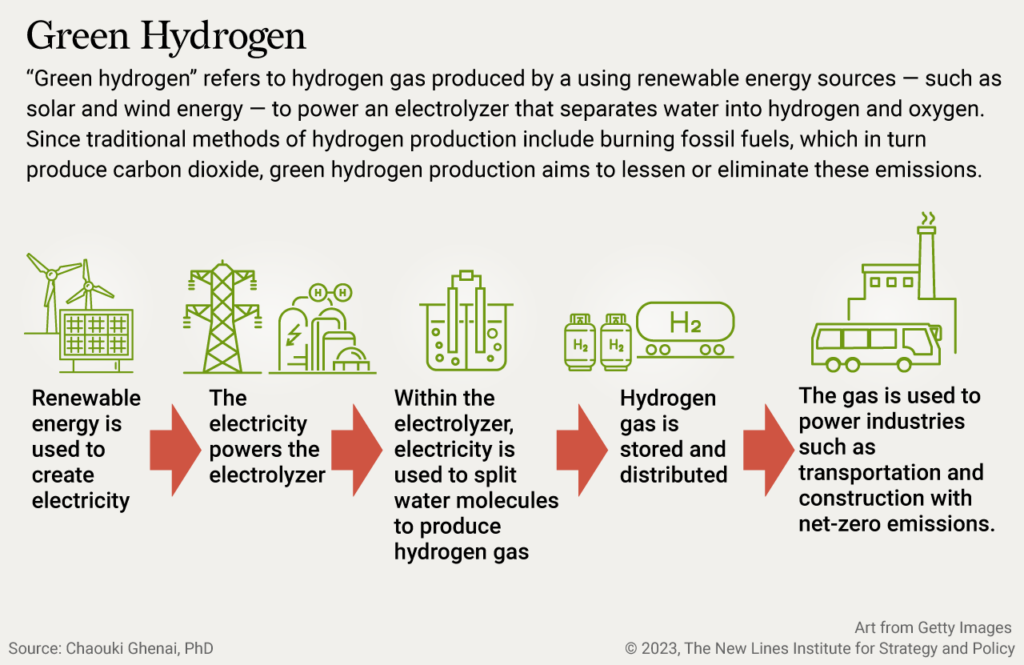
More conventional forms of producing hydrogen use fossil fuels and result in the generation of carbon dioxide as a byproduct, but green hydrogen is created using renewable energy sources, most commonly through the process of splitting water into its separate compounds using electricity (electrolysis). The production of green hydrogen is considered both ecologically beneficial and sustainable when it is powered by renewable sources of energy. Green hydrogen offers a wide range of potential applications, including as a clean fuel for transportation, particularly in cars that use fuel cells, and in the industrial sector, such as with the manufacturing of chemicals and as a feedstock for refining. It can be a key part of attempts to decarbonize industries that are difficult to electrify directly, such as heavy industry, aviation, and shipping.
However, green hydrogen faces obstacles in the form of prohibitive costs, low efficiency, and inadequate infrastructure. Electrolysis techniques can be quite energy intensive, and the cost of renewable electricity continues to be a significant element in the overall production cost. It is thus necessary to invest now in research, development, and infrastructure. The EU and African Union have begun collaborative processes on hydrogen within the framework of the greater Africa-Europe Green Energy Initiative that has already generated investments for multiple hydrogen-related projects within Africa. Most notably, Germany recently announced it would be investing 4 billion euros into clean energy projects on top of the EU’s 3.4-billion-euro investment. Morocco and Algeria have been eyed for their potential related to green hydrogen, but these partnerships must increase to account for the pressure on Europe’s more conventional energy resources in West and North Africa.
Obstacles to Investment
While Algeria’s goals for green hydrogen align with Europe’s, political obstacles exist for policymakers. Algeria has long depended on Russian military aid, with Russia providing 73% of Algeria’s military equipment imports between 2018-2022. Algeria has tried to assert its status of nonalignment internationally, though those efforts have recently proven more difficult given Russia’s war in Ukraine. This dynamic and Algeria’s precarious security situation due to chronic regional instability have opened the country to the possibility of improved relations with other countries, in the West and elsewhere.
The tense state of the Moroccan-Algerian relationship also will pose challenges to European green energy investment. Current tensions between the countries are tied to the disputed Western Sahara region. The Moroccan government claims sovereignty over the territory, while the Algerian government supports the pro-independence Polisario Front movement. The Trump administration’s recognition of Morocco’s claim to the territory in return for Morocco normalizing relations with Israel under the Abraham Accords in 2020 hurt both U.S.-Algerian relations and Algerian-Moroccan relations by default; the Biden administration said it would review this policy while in office but has made no changes yet. In August 2021, the Algerian government completely ended diplomatic ties with Morocco over accusations of Morocco instigating wildfires and supporting rebel movements in Algeria. with Morocco over accusations of Morocco instigating wildfires and supporting rebel movements in Algeria.
However, there is precedent for navigating the region’s geopolitical tensions. In June 2020, Morocco and Germany signed an agreement to work toward green hydrogen production together, with the German government pledging an initial $300 million investment. Germany has also connected with the Algerian government by having its development bank plan to invest in Algeria’s green hydrogen industry.
Policy Recommendations
A European-North African relationship targeting renewable energy stands to benefit all parties. Europe must create more long-term options for energy that help the continent commit further to reaching net-zero emissions by 2050. Simultaneously, security and instability concerns in major natural gas- and oil-producing countries in West and North Africa hamper those countries’ ability to meet Europe’s energy demands. With these problems likely to continue, Europe should further invest in African renewable energy, particularly in Morocco and Algeria, which would benefit from the assistance toward their own climate-related goals.
Morocco has been a regional leader in developing and implementing renewable energy initiatives, something that the EU has already recognized and can be even further targeted to support Europe’s energy-related goals through the production of green hydrogen. In October 2022 ahead of the COP27 summit, the EU and Morocco announced their Green Partnership, which encourages coordination, progress toward common goals, and other ideals. This partnership complements the wider Africa-EU Green Energy Initiative and has led to the creation of specific mechanisms on social security, the green transition, migration, and more.
Additional investments should be allocated to supporting Morocco’s green hydrogen program, which the Moroccan government said it will begin implementing in 2024. The German government has already begun to take action on this recommendation, and it is in the best interest of other European policymakers to follow Berlin’s lead. The existing relationship between the EU and Morocco, combined with the competitive advantage North Africa maintains in the production of green hydrogen, allows for this renewable energy source to be a viable option for European policymakers to consider when administering funding.
EU-Algerian cooperation on renewable energy is less pronounced than with Morocco but remains relevant for European policymakers. In the fifth annual “high-level political dialogue on energy” between the EU and Algeria in October 2023, the two parties discussed renewable hydrogen, with specific mention given to Algeria’s national hydrogen roadmap announced in July 2023. This roadmap includes the aim to supply Europe with 10% of its clean hydrogen demand by 2040. Algeria in January 2023 signed an agreement with the Italian government to construct a new pipeline between the two countries with a capacity of 8 to 10 billion cubic meters per year to transport natural gas, hydrogen, and ammonia. Germany also is poised to take advantage of Algeria’s renewable energy resources as it heads toward becoming Europe’s “largest hydrogen supporter,” in part by its development bank planning to invest in an upcoming Algerian green hydrogen project.
Increased European investment in Moroccan and Algerian renewable energy benefits U.S. political goals internationally and in North Africa, making it critical for U.S. policymakers to privately and publicly champion Europe’s investments and, in turn, encourage more European nations to invest. Europe investing in alternatives to Russian energy will help strengthen the resolve of countries like Germany to withstand Russian pressure to undermine the Western response to the war in Ukraine. European countries improving their relations with the Algerian government through investments in renewable energy also can provide a window for the U.S. to develop goodwill with Algiers.
Algeria is crucial to the African counterterrorism sphere and can be a potential balancer against Russian dominance in North Africa, but the Trump administration exacerbated the historically weak relations between the U.S. and Algeria by its decision to support Morocco’s claim to the Western Sahara. The U.S. publicly leading other European nations to invest in Algerian green hydrogen infrastructure stands a chance at improving this relationship. An improved U.S.-Algerian relationship also has the potential to cause greater counterterrorism cooperation between the two countries as the al Qaeda and ISIS affiliate-led insurgency worsens in the Sahel to Algeria’s south.
Facing limited options for conventional energy amid instability in some of the top gas- and oil-producing states in North and West Africa, it is in Europe’s long-term interest to invest more in renewable energy options such as green hydrogen in partner states like Algeria and Morocco. The investing European nations, Morocco, and Algeria would all reap the climate-related benefits of making the clean transition as well as geopolitical ramifications of lessening reliance on Russian energy for Europe. At the same time, the role of the U.S. in publicly and privately calling on more European nations to fund these green hydrogen investments will help the U.S. build sustained goodwill with Morocco and Algeria.
Carolyn Moorman is an Analyst at the New Lines Institute where her research focuses on non-state actors in the Middle East and West/Central Africa. She also produces the Institute’s Contours podcast. Previously, Carolyn conducted research at the American Enterprise Institute’s Critical Threats Project and the Institute for the Study of War. She previously assisted Dr. Nathan French with research in Miami University’s Department of Comparative Religion and interned at the Heritage Foundation and the U.S. Embassy of Luxembourg. She tweets at @Carolyn_Moorman
Prof. Chaouki Ghenai is a Non-Resident Senior Fellow for Energy Strategy and Policy at the New Lines Institute. He oversees new energy initiatives for New Lines Institute, including: Future and Innovative Energy Technologies, Geopolitics of Energy Transformation, Clean Energy Financing, New Energy Policies, and Sustainable Energy and Society. He has more than 25 years of research experience in the energy field and management of Clean Energy Research Programs and Research Funding at universities including the University of Sharjah, Florida Atlantic University, and University of California, Los Angeles.
The views expressed in this article are those of the author and not an official policy or position of the New Lines Institute.

